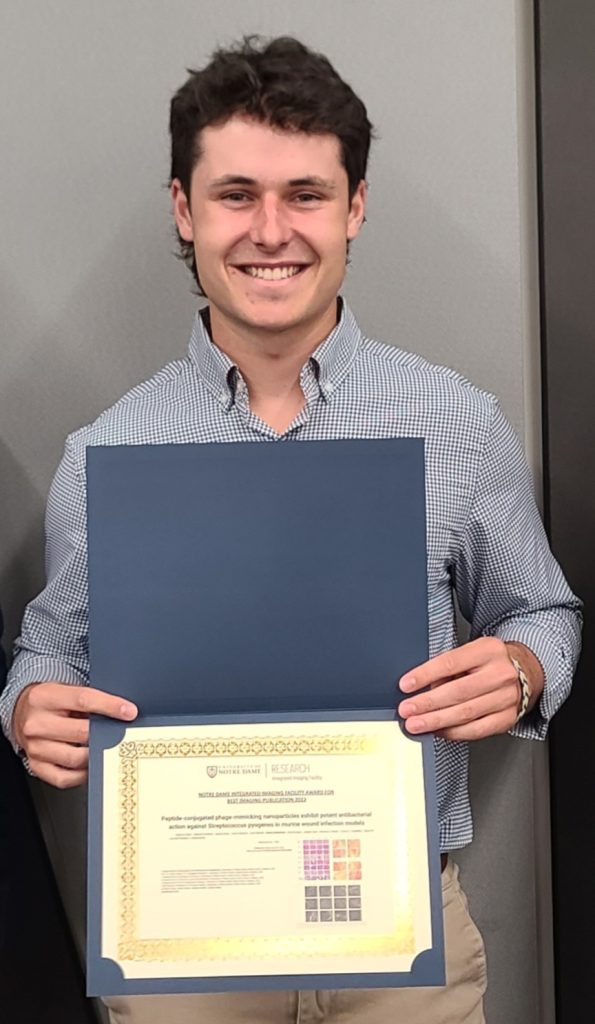Notre Dame senior Kevin Armknecht, affiliated with the Berthiaume Institute for Precision Health, has earned the Best Publication Imaging Award from ND’s Integrated Imaging Facility (NDIIF) for images he contributed to a recent Nanoscale Advances publication.
Armknecht, who is majoring in pre-professional studies with minors in compassionate care in medicine and poverty studies, produced these images for the paper titled, “Antimicrobial peptide-conjugated phage-mimicking nanoparticles exhibit potent bactericidal action against Streptococcus pyogenes in murine wound infection models.” The research was a collaborative effort between the labs of Nallathamby, Lee, and Castellino. Armknecht works under the guidance of Prakash Nallathamby, Ph.D., associate director of research at the Berthiaume Institute for Precision Health and assistant professor of practice in the bioengineering program within the Department of Aerospace and Mechanical Engineering in the College of Engineering.
Since the beginning of his junior year, Armknecht has been involved in research at Nallathamby’s lab, focusing on the application of nanoparticles to treat Streptococcus pyogenes, a significant human-specific bacterial pathogen responsible for various infections, including strep throat. The lab’s research centers on nanotechnology as a novel therapeutic approach to addressing challenges like antibiotic resistance.
“My work primarily focuses on bacteria,” Armknecht explained. “I synthesize nanoparticles and test them against bacteria to see if they outperform antibiotics and offer more sustainable long-term solutions. The nanoparticles are smaller than bacterial cells, allowing them to penetrate the cell wall, enter the bacterial cell, and disrupt the internal mechanisms that enable the bacteria to infect humans.”
Armknecht’s award-winning images specifically highlighted the use of nanoparticles conjugated with a peptide called Syn-71 from Shaun Lee, Ph.D., Monahan Family Associate Professor of Rare and Neglected Diseases. This combination effectively kills Streptococcus pyogenes while minimizing damage to host cells.
“Using just the peptide, as some researchers have done, is very effective at killing bacteria, but it’s not very safe for human cells. Nanoparticles, however, are less toxic to human cells compared to many antibiotics,” he noted. This combination disrupts the classic chain structure of the bacteria.
One of Armknecht’s favorite images from the publication shows nanoparticles overwhelming the bacteria, with the bacterial structure destroyed and chain formation absent. “It was a really cool image to see,” he said.
Armknecht refined his imaging skills during an NDnano Undergraduate Research Fellowship (NURF) in the summer of 2023, working in Nallathamby’s lab.
His exceptional research, dedication, and impressive imaging skills led to his nomination for the award. Nallathamby praised Armknecht’s contributions, highlighting his role in keeping the project on track through extensive literature reviews, experimental design, nanoparticle synthesis, testing, and sample preparation for microscopy.
“Kevin is an invaluable asset to the lab,” Nallathamby stated. “He collaborates well, trains new students, manages his own work, and goes above and beyond to ensure tasks are completed. I can always rely on him.”
Following graduation, Armknecht plans to take a gap year before applying to medical school. He has also contributed to two additional research projects in Nallathamby’s lab, with one manuscript recently accepted for publication in Military Medicine and another in progress.



Recent Comments